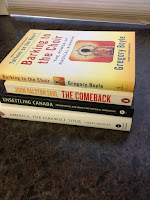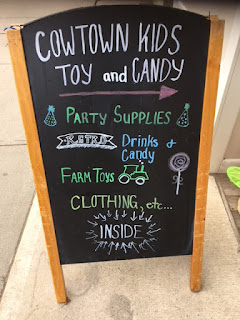 So, surprise, for real, I didn’t drown
after all in the sea of non-fiction that described the decay of a
civilization. I came up for air,
from time to time, for longer and longer periods. How did I choose the books? Favorite authors,
Canada Reads selections, incidental recommendations, language, and, of
course, pure chance.
So, surprise, for real, I didn’t drown
after all in the sea of non-fiction that described the decay of a
civilization. I came up for air,
from time to time, for longer and longer periods. How did I choose the books? Favorite authors,
Canada Reads selections, incidental recommendations, language, and, of
course, pure chance.
English
Language, in order of enjoyment, not necessarily
literary merit:
Dear Girl, by Amy Krouse Rosenthal and Parish
Rosenthal (2017)
Readers of this blog know my obsession with AKR’s books. Her last book celebrates girls, and
encourages them to be everything they can be, with practical suggestions for
how to do that. A must for every
young girl. "Dear girl, Keep
that arm raised! You have smart
things to say!"
 This Is How It Always Is by Laurie Frankel (2017)
This Is How It Always Is by Laurie Frankel (2017)
Best fiction of the year in my set. Frankel tackles the subject of transgender children, with
empathy, relatable characters, and language at once fresh and delicate. Masterfully written.
Origin, by Dan Brown
(2017)
I loved the book, and was surprised that some people I talked to
thought it formulaic in the Dan Brown style. Somehow, although I’ve read all the books in the Da Vinci
Code series, the historic, geographical, and architectural detail about Spain swept
me up as much as the plot. " 'There is only one way Christianity will survive the coming age of
science. We must stop rejecting
the discoveries of science. We
must stop denouncing provable facts.
We must become a spiritual partner of science, using our vast
experience—millennia of philosophy, personal inquiry, meditation,
soul-searching—to help humanity build a moral Framework and ensure that the
coming technologies will unify, illuminate, and raise us up . . . rather than
destroy us.' "
American War by Omar
El Akkad (2017)
Very powerful novel, dark, and intricately connected to the non-fiction
I read on a similar topic. In
Canada Reads, it finished second to Forgiveness (comments below).
Turtles All the Way Down by John Green (2017)
John Green’s quirky characters and authentic voice will always bring me
back. I’ve read all his books
(e.g. The Fault In Our Stars, Looking for Alaska) and never tire. " 'We are about to live the
American Dream which is, of course, to benefit from someone else’s misfortune. ' " (p. 23)
A Death in Vienna by
Daniel Silva audio book
The English Assassin
by Daniel Silva (2002)
The Confessor by
Daniel Silva (2003)
The Kill Artist by
Daniel Silva (2000)
The Daniel Silva run began quite by accident with an audio book from
the library that I thought might keep me awake and, optimally, intrigued, during
a nine-hour drive home solo from Calgary.
Worked in spades. The world
of spies and assassins, and the people mixed up in it, made the kilometres
fly. I hunted down three other
books by Daniel Silva, whom I had never read before, and they bridged some
serious non-fiction. I will go
back.
The Stars are Fire by
Anita Shreve (2017)
Anita Shreve died of cancer at age 71 while I was reading this
book. Based on a historic fire in
Maine in 1947, this is the fictional story of Grace Holland’s self-discovery as
she struggle to survive in that crisis.
A Darkness of the Heart by Gail Bowen (2018)
On her book tour, Gail Bowen dropped in to our local library for a
chat. She delighted and
inspired. This read reminded me of
how subtly she contextualizes each new Joanne Kilbourn novel and establishes
the threads for the next one.
Drums in Autumn by
Diana Gabaldon
The Fiery Cross by
Diana Gabaldon
I love the Outlander series, especially the first three volumes. Season four of the television series
prompted me to refresh my memory of volumes four and five, that I had never
reread. Without six or seven years
between tomes, I was able to make connections that had eluded me.
The Color of Rain by
Micahel and Gina Spehn (2011)
Simply the book that inspired a TV movie that I enjoy overcoming tragedy and blending families.
Macbeth by Jo Nesbø (2018)
An author courageous enough to retell the Macbeth story in 1970’s
America has my attention. Slow and dreary for the first forty pages or so, the
novel did grapple with the essential questions Shakespeare asks in his
play. What catalysts could trigger the "secret man of
blood" that lies dormant people?
The Marrow Thieves by
Cherie Dimaline (2017)
Forgiveness:
A Gift From My Grandparents by Mark Sakamoto (2017)
Two Canada Reads choices that, in my mind, didn’t meet the expectations
the reviews and comments had set. Worthwhile reads, both. The first explores indigenous issues with which Canadians continue to grapple, and the second honours the character of Japanese Canadians imprisoned in Canada during World War II and stripped of their possessions, and still able to forgive.
The Winners’ Circle by
Gail Bowen (2017)
Another Joanne Kibourne novel.
Unfortunately, Bowen gets caught in the recapitulation trap, and her
trademark invisible weaving of past threads gives way instead to a whole
chapter of catch-up that detracts from this book.
French
Language
 Chanson douce de Leïla Slimani (2016)
Chanson douce de Leïla Slimani (2016)
Disponible en anglais sous le titre The
Nanny (2018). Une femme se
rend indispensable à une famille professionnelle après la naissance de leur
deuxième enfant, avec des conséquences tragiques. « Son cœur s’est endurci. Les années l’ont recouvert d’une écorce épaisse et froide et
elle l’entend à peine battre. Plus
rien ne parvient à l’émouvoir.
Elle doit admettre qu’elle ne sait plus aimer. » (p 230)
La meilleure façon de marcher c’est celle du flamant
rose de Diane Ducret (2018)
Un roman déprimant, et difficile à lire pour cette raison, à mon
avis. Simplement un surcroit de
peine et de défis. « Mais
celui qui a inventé le bateau a aussi inventé le naufrage, il ne faut donc pas
s’enorgueillir de ses succès passagers; il est nécessaire d’œuvrer toujours
avec vertu, courage et humilité, se vaincre soi-même pour triompher de tout. »
(p 154)
Madame
Tout-le-monde de Juliette Thibault (2011)
Premier roman d’une série; le deuxième tome m’attend toujours. Ce livre est une recommandation d’une
amie, et je comprends pourquoi. La
langue presque archaïque me distrait, cependant. Je me rends compte de nouveau que je préfère les romans
français que j’ai lu dernièrement, pour leur langue beaucoup plus naturelle.
 In Sarah, Plain and Tall, Jacob, a widower with two young children,
places an advertisement in the newspaper for a wife. He receives a reply from a woman from Maine, who accepts to
come to the American prairies for a month to see how things are before she makes a commitment. Maggie, a neighbour originally from
Tennessee who has married the man to whose advertisement she had herself responded,
asks Sarah, "'You are lonely,
yes?'" Maggie continues, "'I miss the hills of Tennessee sometimes.'" When Sarah replies that she misses the
sea, Maggie adds, "'There are always things to miss.'"
In Sarah, Plain and Tall, Jacob, a widower with two young children,
places an advertisement in the newspaper for a wife. He receives a reply from a woman from Maine, who accepts to
come to the American prairies for a month to see how things are before she makes a commitment. Maggie, a neighbour originally from
Tennessee who has married the man to whose advertisement she had herself responded,
asks Sarah, "'You are lonely,
yes?'" Maggie continues, "'I miss the hills of Tennessee sometimes.'" When Sarah replies that she misses the
sea, Maggie adds, "'There are always things to miss.'"



















